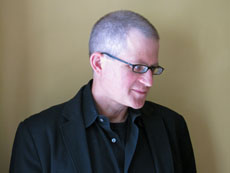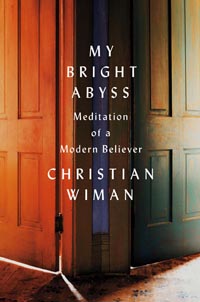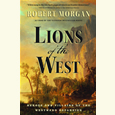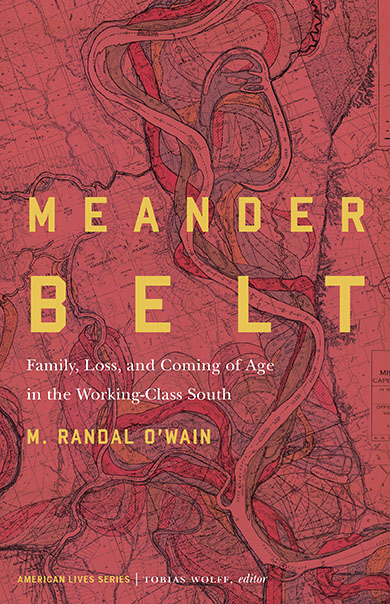Staring Into the Abyss
Christian Wiman, former editor of Poetry magazine, searches for the “poetry and prose” of contemporary faith
“When you gaze long into the abyss,” Friedrich Nietzsche wrote, “the abyss also gazes into you.” It’s hard not to read this possibility as a harrowing experience. The word “abyss” measures only the extremes of human experience and imagination: an immeasurable chasm, a descent into Dante’s Inferno, or anything unfathomable or infinite, like the light-swallowing depths of the ocean. Some words cannot transcend their negative connotations. We fear them even as we fail to grasp their reference.
The abyss retains its powerful hold on the imagination, particularly for people of faith—the writers of Genesis and the Psalms, medieval and modern mystics, the thinkers of negative theology—because the very word holds within it both oblivion and eternity. As an image of the divine, it escapes full human understanding and yet continually invites our curiosity. In his bestselling memoir, My Bright Abyss: Meditation of a Modern Believer, Christian Wiman stares into the silences in the words we fear and the realities that shatter us.
 Raised a Baptist in a small West Texas town, Wiman did not meet a non-Christian until he went to college in Virginia. There he became an intellectual atheist with the fervency of a convert. Later he traveled internationally, read for five hours every day, worked odd jobs and bartered skills for room and board until he emerged as a poet and literary critic, eventually rising to the editorship of Poetry magazine in 2003. (He recently resigned that position to teach at the Yale Institute of Sacred Music.)
Raised a Baptist in a small West Texas town, Wiman did not meet a non-Christian until he went to college in Virginia. There he became an intellectual atheist with the fervency of a convert. Later he traveled internationally, read for five hours every day, worked odd jobs and bartered skills for room and board until he emerged as a poet and literary critic, eventually rising to the editorship of Poetry magazine in 2003. (He recently resigned that position to teach at the Yale Institute of Sacred Music.)
Even when there was no God in it, no belief which he consciously held or meant to convey in poetry, his work shares resonances with the great devotional poets—Herbert, Hopkins, Eliot—and Wiman believes that his early poems were haunted by God. In his late thirties, he fell in love with and married another poet, and though his new wife was not actively religious, they found themselves praying together. Eventually they began attending a small, progressive Congregationalist church near their home. The year they married, on his thirty-ninth birthday, Wiman was diagnosed with a rare, incurable blood cancer, capable of taking his life in six months or sixteen years. For nearly a decade, he has endured chemotherapy, bone-marrow transplants, and tumors he could feel beneath his skin.
In My Bright Abyss Wiman displays both a poet’s grasp of language and a translator’s ease with gaps, diving into the difficult questions of human existence: What is God? What is grace? What waits for us beyond our lives, and how do we perceive it? Where does love—a power that both obliterates and eternalizes us—fit into it all?
To answer these questions, Wiman gathers poems, mystical theology, philosophy of language, and personal experience in an arrangement of meditations, some etched out during long hospitalizations or recovery from painful procedures. With each word chosen as carefully as a last word, phrases carry weight, worthy of an epitaph. And yet the book, made up of seemingly disparate parts, becomes complete as it reaches its final consummation, ending where it began—with a belief in the concrete silence and eternal radiance of our shared reality:
My God my bright abyss
Into which all my longing will not go
Once more I come to the edge of all I know
And believing nothing believe in this:
 The quotation above is not a passage but the entire poem. Wiman begins his book by setting the task of finishing it (in prose if not verse), but he also calls it a failure, understanding that there is more but not having words for what comes next. He takes us into that silent space and beyond it, inviting us into pain, physical and metaphysical: “I never felt the pain of unbelief until I began to believe,” he writes, before breaking the pain open with joy.
The quotation above is not a passage but the entire poem. Wiman begins his book by setting the task of finishing it (in prose if not verse), but he also calls it a failure, understanding that there is more but not having words for what comes next. He takes us into that silent space and beyond it, inviting us into pain, physical and metaphysical: “I never felt the pain of unbelief until I began to believe,” he writes, before breaking the pain open with joy.
In My Bright Abyss, Wiman writes for the literary mind more than for the believing heart, confessing that he gets so bored in church that he often recites poems to himself to stay awake. But the poems and excerpts he includes from George Herbert, William Wordsworth, Paul Celan, Osip Mandelstam (translated from the Russian by Wiman), and Fanny Howe insert a breath, a moment of devotion, in this slim book that burrows toward an untimely end. Wiman creates for readers a yearning for a poetics of belief even as he himself craves “the prose of knowing”:
Inspiration is to thought what grace is to faith; intrusive, transcendent, transformative, but also evanescent and, all too often, anomalous. A poem can leave its maker once more deeply seized by existence and, in a profound way, alienated from it, for as the act of making ends – as the world that seemed to overbrim its boundaries becomes, once more, merely the world. … Grace is no different. To experience grace is one thing; to integrate it into your life is quite another.
As the treatments for his cancer become more intrusive and intensive, Wiman is clear that what he needs even more than communion with God is connection with people: “What one craves is supernatural love, but one finds it only within human love,” he writes, and demonstrates this point most poignantly in a letter to his two young daughters:
My loves, I love you with all the volatility and expansiveness of spirit that you have taught me to feel, and I feel your futures opening out from you, and in those futures I know my own. I will be with you. I will comfort you in your despair and I will share in your joy. They need not be grief, only pain, these black holes in our lives. If we can learn to live not merely with them but by means of them, if we can let them be part of the works of sacred art that we in fact are, then these apparent weaknesses can be the very things that strengthen us. Life tears us apart, but through those wounds, if we have tended them, love may enter us.
Christian Wiman will speak at the Buechner Institute at King University in Bristol on April 24, 2014, at 7 p.m. The event is free and open to the public.


